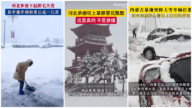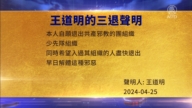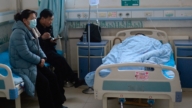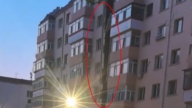【新唐人2013年02月20日訊】最近中國大陸多個省份或地區突然推出新規定,限制查詢樓房資料。推出房屋信息查詢規範的地方,包括福建漳州、江蘇鹽城、北京、廣州和深圳等地。新規定嚴禁以人名查詢業主,或限定司法部門可以查詢。輿論質疑新措施是當局為保護貪官,阻止外界公開官員財產。是反貪腐的大倒退!
2月中旬,福建漳州市出臺了《房屋權屬登記信息查詢暫行辦法》。根據這個辦法,除申請查詢本人房屋信息,或國家公、檢、法等機關的協助查詢外,嚴禁以姓名(名稱)為條件進行查詢,只能以明確的房屋座落,或房屋所有權證編號進行查詢,查詢工作人員對房屋權屬信息的內容保密,嚴禁查詢業主資料。
而江蘇鹽城市日前也出臺《鹽城市房屋登記信息查詢管理辦法(試行)》,對房屋信息實行有條件查詢和限制查詢。除本人、公檢法、住房保障部門、律師等通過一定程序,其他情形「一律嚴禁以人查房」。辦法宣稱,部分地區個人住房信息的不正常流出,「引發了部分市民對個人住房信息安全的擔憂,社會各界也頗為關注。」
在廣州,以前查詢產權,只要有房產證編號或房產地址任何一個信息就可以查詢,但1月起,需要同時提供房產證編號、地址、登記字號等才可以查詢。
北京時政觀察人士華頗:「因為現在報出了那麼多的房事家族,而且都是普通的公民查索的,常常各級紀委是跟著公民的舉報,鬧得各級紀委和公安機關都很被動,雖然這樣是可以做到真正反腐,但是對執政者來說,並不是甚麼好事情。所以各地為了遮醜,所以出臺了這些所謂的規定吧!就是不能夠隨便查詢公民的財產。」
大陸媒體報導指出,各地的新政策都是以「保障個人私隱」為名,但住建部2006年已出臺《房屋權屬登記信息查詢暫行辦法》,明確規定單位和個人可以公開查詢樓房資料。
廣州維權律師唐荊陵認為,新法規的出臺,是為了保護官員,不是為了保護公民的隱私。
廣州維權律師唐荊陵:「本來對於普通公民的房產信息的隱私保護,法律上是有一些規則的,可以保證普通公民的隱私不被隨意的洩露,但是現在廣州以及最新新聞出現的地方法規,對房產信息的保護給予過份嚴格的規則,就是讓民眾要查詢到官員的房產信息變得十分困難了。所以在程序上應該重在保護地方公民的隱私,而對官員的財產信息持一個相對開放的態度。」
「北京理工大學」教授胡星斗向媒體表示,新措施背後的目地,是阻止一般人公開官員財產,是倒退的做法,是公然對抗中央反腐舉措。顯示利益集團正在千方百計保護腐敗,阻止反貪「打老虎」。
而《中國青年網》也發表評論文章批評,這是對大眾的愚弄和污辱,實為「護賊心虛」。
北京憲政學者陳永苗:「權貴官僚集團會把反腐敗當作一種維權的表演,看起來覺得他很清廉,實際上反腐敗也是他利益最大化——造成他形象很好。許宗衡就是這樣子,人家都覺得他很清廉,實際上貪了很多!」
網民也紛紛炮轟查詢房產信息新規定是讓「貪腐合法化」。
唐荊陵:「因為如果公開說它腐敗,那它這政黨,我看一天都搞不下去,所以它嘴上也會高調的講著反腐。所以在輿論上,它必須得迎合民眾的輿論,但是在實際意義上它又和民眾的意願相反。」
也有網民擔憂,中共新領導層反腐舉措可能將「鳴金收兵」!唐荊陵則表示,專制政府需要依靠腐敗生存,所以中共政權不可能真正的反腐。他認為,要切實反腐,就必須實行民主、自由和憲政的社會制度。
採訪/李韻 編輯/周平 後製/蕭宇
New Property Law Angers Mainlanders
Recently, several Mainland China cities swiftly implemented
new measures to limit the search of property ownership data.
They launched measures in specific areas, like Zhangzhou
(Fujian), Yancheng(Jiangsu), Beijing, Guangzhou, Shenzhen.
The new measures ban searching by names of homeowners,
only allowing legal departments to do the searches.
The public thinks these new measures are to protect corrupt
officials and stop people from publicizing officials’ property.
This pulls the “anti-corruption” initiative backward.
In mid-February, Zhangzhou City in Fujian
launched a “housing registration measures.”
It states, only homeowners themselves, the police, the court,
or the legal departments can search for property information.
The new regulation does not allow the public to check
on homeowners’ names and other related data.
The public is only allowed to check property information
by providing the property certificates numbers.
The staff should keep the information confidential,
as it is not allowed to provide information on properties.
Yancheng City in Jiangsu also launched draft measures,
allowing to check property information under a condition.
Search on homeowners’ names is prohibited, except for
the homeowners, police, court, and legal departments, and they have to follow the required procedure,
The measures say, some regions leaked homeowners data,
“causing citizens to worry about their property privacy. These measures drew outsiders’ attention.”
In Guangzhou, in the past, information could be obtained
by providing property certificates number or home address.
Since January, one needs to provide property certificates
number, home address and registration number.
Hua Puo, Beijing Current Affairs Observer: “Many
Homeowners’ data had been exposed by ordinary citizens.
Usually, the Discipline Committee would make a follow up
after citizens expose corrupted officials’ cases.
This made the authorities feel useless.
Although this way real anti-corruption can be achieved,
for the leadership this isn’t good at all.
Thus, in order to cover up the scandals,
each region had launched these so-called measures.
In other words, you can’t casually enquire
for personal property information.”
Media in the Mainland China reported that new measures
are using the excuse of “privacy protection.”
However, a measure issued in 2006, clearly says, workplaces
and individuals can freely search property information.
Tang Jingling, Guangzhou human rights lawyer believes,
the new measures are only to protect officials, not civilians.
Tang Jingling: “Originally, ordinary citizens’
property information was confidential.
This has been written in a law, to ensure citizens’
confidential data must not be casually leaked out.
But now, in Guangzhou, where media is used to spread
the new measures, it means privacy protection gets too strict.
In other words, it makes more difficult for the public
to search officials’ property obtained through corruption.
Thus, the process should concentrate on protection
of local citizens’ privacy.
Regarding officials’ property information,
it should be more open.”
Hu Xingdou, a Professor at Beijing Institute of Technology
spoke to the media on the issue.
The real purpose behind the new measures is to stop people
from publicizing officials’ property, it is a step backwards.
This is an open resistance against the central government’s
anti-corruption initiatives, thinks Prof. Hu.
It shows how interest groups are doing their best to cover up
corruption and impede authorities “anti-corruption” efforts.
The website China Youth published a critical article,
saying that the measures fool and insult the public.
They are more like “protecting a thief
with a guilty conscience,” the article points out.
Chen Yongmiao: “Interest groups consider anti-corruption
as a show of maintaining human rights.
They display how clean they look on the surface. Anti-
corruption can work for them, as it can create a good image.
Xu Zongheng is a good example for that, everyone thought
he is clean, when in fact, he is very corrupt.”
Netizens commented that the new regulations
are to ‘legalize the corruption.’
Tang Jinglin: “If it is said openly that the CCP (Chinese
Communist Party) is corrupt, they can’t survive for a day.
Thus they talk in such a high profile manner
about anti-corruption.
The CCP must cater for the public’s opinions,
but the reality is, it doesn’t care about the will of the people.”
Some netizens are worried, the CCP new leadership
may withdraw the anti-corruption measures.
Tang Jingling believes, autocratic regimes must rely
on corruption to survive.
Thus it is impossible for the CCP
to truly implement anti-corruption measures.
Tang said, to be effective in anti-corruption, democratic,
free and constitutional systems must be implemented.





























